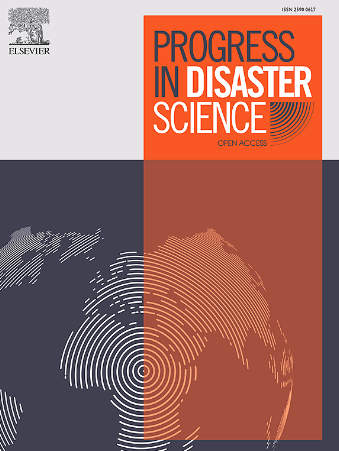Knowledge, attitude, and preparedness to respond to heat waves among informal workers in Dhaka, Bangladesh
IF 3.8
Q3 ENVIRONMENTAL SCIENCES
引用次数: 0
Abstract
Heat waves pose a growing threat amid climate change, impacting human health and the environment. This study focuses on the Dhaka Metropolitan Area (DMA) to explore the knowledge, attitudes, and preparedness of informal workers regarding heat waves. The research adopts a quantitative approach, employing a multi-stage sampling technique to survey 420 respondents in four selected thanas of DMA. Well-structured questionnaires, adapted from previous studies, were administered through face-to-face interviews, with real-time monitoring using Kobo Toolbox. Results reveal a significant gap in knowledge, with 66.66 % of respondents exhibiting a moderate level. Attitudes vary, as 49.6 % hold a mid-level attitude, expressing concern about heat waves but showing reluctance to change behavior. Preparedness is low, with 62.7 % having minimal readiness for heat-related emergencies. The study found statistically significant correlation between knowledge and attitude (r = 0.202), between knowledge and preparedness (r = 0.291), and between attitude and preparedness (r = 0.142). The findings contribute to practical insights for policymakers to enhance resilience among informal workers, informing public health policies, identifying vulnerable groups, and guiding future research and interventions in the context of heat waves and climate change.
孟加拉国达卡非正规工人应对热浪的知识、态度和准备
热浪在气候变化中构成越来越大的威胁,影响着人类健康和环境。本研究的重点是达卡大都市区(DMA),探讨非正式工人对热浪的知识、态度和准备情况。本研究采用定量方法,采用多阶段抽样技术,在DMA的4个地区抽取420名受访者进行调查。通过面对面访谈,采用Kobo工具箱进行实时监测,根据以前的研究进行结构良好的问卷调查。结果显示,在知识方面存在显著差距,66.66%的受访者表现出中等水平。态度各不相同,49.6%的人持中等态度,表示担心热浪,但不愿改变行为。准备程度较低,62.7%的人对与高温有关的紧急情况准备程度最低。研究发现,知识与态度(r = 0.202)、知识与准备(r = 0.291)、态度与准备(r = 0.142)之间存在统计学显著相关。研究结果有助于为政策制定者提供实际见解,以增强非正式工人的抵御能力,为公共卫生政策提供信息,确定弱势群体,并指导未来在热浪和气候变化背景下的研究和干预措施。
本文章由计算机程序翻译,如有差异,请以英文原文为准。
求助全文
约1分钟内获得全文
求助全文
来源期刊

Progress in Disaster Science
Social Sciences-Safety Research
CiteScore
14.60
自引率
3.20%
发文量
51
审稿时长
12 weeks
期刊介绍:
Progress in Disaster Science is a Gold Open Access journal focusing on integrating research and policy in disaster research, and publishes original research papers and invited viewpoint articles on disaster risk reduction; response; emergency management and recovery.
A key part of the Journal's Publication output will see key experts invited to assess and comment on the current trends in disaster research, as well as highlight key papers.
 求助内容:
求助内容: 应助结果提醒方式:
应助结果提醒方式:


